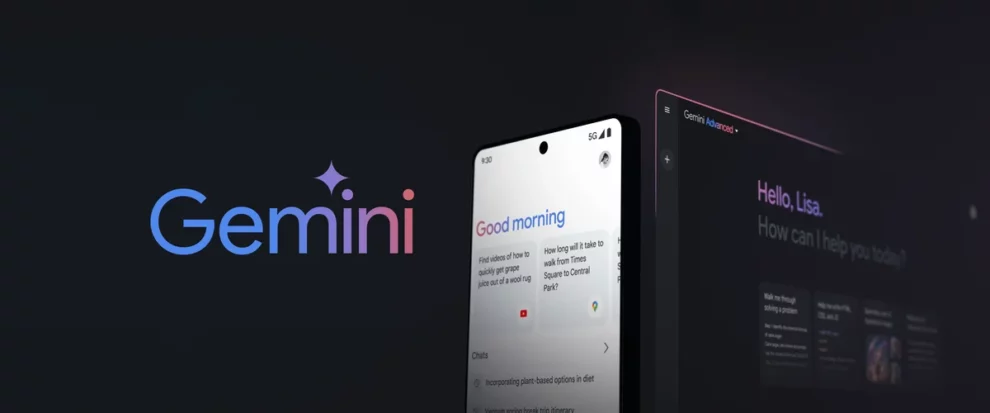Google is enhancing its Gemini chatbot with a new feature that promises to make interactions more meaningful and efficient. Starting today, the company’s advanced AI assistant will recall past conversations, allowing users to build on previous discussions or projects without starting from scratch. This update aims to streamline user experiences by eliminating repetitive explanations and enabling seamless continuity in dialogue.
The improved functionality means users can now pick up where they left off, whether it’s continuing a brainstorming session, refining ideas for a project, or revisiting topics previously discussed. That means no more starting over from scratch or having to search for a previous conversation thread,” Google explains. Plus, you can build on top of previous conversations or projects you’ve already started.” By retaining context from earlier exchanges, Gemini becomes a more intuitive and helpful tool for productivity and creativity.
To address concerns about privacy and data retention, Google assures users that they have full control over their chat history. The company notes that Gemini “may” indicate when it references a past conversation to craft a response, giving users transparency into how the system operates. For those who feel uneasy about a chatbot remembering details about them, options are available to manage this behavior. Users can easily review, delete, or set limits on how long Gemini retains their chat history through the My Activity panel. Additionally, the memory feature can be disabled altogether if desired, ensuring individuals retain agency over their interactions.
This development places Gemini among the ranks of other cutting-edge chatbots incorporating memory capabilities. While not the first to implement such a feature, Google’s approach aligns with broader industry trends toward creating more personalized and context-aware AI assistants. For instance, OpenAI’s ChatGPT also includes a memory function, though its implementation differs slightly. In practice, this means ChatGPT might recognize patterns or preferences based on prior interactions. An example of this came during a recent exchange where I asked ChatGPT about Jeff Buckley’s vocal range. Later, the bot followed up by asking if I was a fan of his music, updating its internal memory accordingly after receiving confirmation.
The inclusion of memory features in modern chatbots reflects a growing emphasis on what some experts call “agentic” AI—a vision of artificial intelligence designed to act as proactive, reliable partners rather than mere tools. Companies like Google and OpenAI envision AI systems capable of maintaining long-term relationships with users, adapting to their needs, and learning from ongoing interactions. At Google’s annual developer conference, I/O 2024, the company showcased Project Astra, an experimental initiative highlighting the potential of memory-enhanced AI. Although Project Astra’s memory capabilities were limited to shorter timeframes and occasionally prone to inaccuracies, it demonstrated the direction in which AI research is heading.
Gemini’s newly introduced memory feature represents a significant step forward in this journey. Unlike Project Astra, which faced limitations in scope and reliability, Gemini’s implementation appears more refined and practical for everyday use. Initially launching in English for Gemini Advanced subscribers, the feature will expand to additional languages in the coming weeks, making it accessible to a wider audience. This gradual rollout underscores Google’s commitment to testing and refining the technology before widespread adoption.
For businesses and professionals, the ability to carry over context between sessions could revolutionize workflows. Imagine collaborating with Gemini on a marketing campaign, sharing initial concepts, receiving feedback, and then returning days later to refine the strategy—all while the chatbot maintains awareness of the project’s history. Similarly, students and researchers might benefit from Gemini’s capacity to remember sources cited in prior discussions, helping them stay organized and avoid duplicating efforts.
However, as with any technological advancement, there are ethical considerations to weigh. The idea of AI storing personal information, even temporarily, raises questions about consent, security, and misuse. To mitigate these risks, Google emphasizes user empowerment through transparent controls and clear communication. By offering granular settings for managing chat histories, the company seeks to balance innovation with respect for individual privacy.
Moreover, the effectiveness of Gemini’s memory feature will depend heavily on its accuracy and relevance. If the chatbot frequently misinterprets or misapplies past conversations, it could frustrate users instead of assisting them. Google must ensure that Gemini’s memory system is robust enough to handle complex scenarios while remaining flexible enough to adapt to changing contexts. Achieving this delicate equilibrium will require continuous improvements driven by real-world feedback.
In the broader landscape of AI development, Gemini’s memory enhancement serves as a microcosm of the challenges and opportunities facing the industry. As companies strive to create ever-more intelligent and responsive systems, they must navigate competing demands for performance, trustworthiness, and ethical responsibility. Google’s approach to this challenge—with its focus on user-centric design and transparent governance—offers a promising model for others to follow.
Looking ahead, the implications of memory-enabled chatbots extend beyond individual convenience. These technologies have the potential to reshape how we interact with digital assistants, transforming them from passive responders into active collaborators. Whether used for professional tasks, educational purposes, or casual entertainment, AI systems equipped with reliable memories promise to deliver richer, more engaging experiences.
As Gemini’s memory feature rolls out to more users and languages, its impact will become increasingly evident. Early adopters may find themselves relying on the chatbot for everything from managing daily schedules to exploring creative ideas. Over time, the cumulative effect of these enhancements could redefine expectations for what AI assistants should be capable of achieving.
Ultimately, Google’s decision to enhance Gemini with memory capabilities reflects a deeper commitment to advancing the field of conversational AI. By prioritizing usability, privacy, and adaptability, the company positions itself at the forefront of a rapidly evolving sector. As other players in the tech industry respond to this move, the competition is likely to spur further innovations, driving the entire field forward.
For now, Gemini’s newfound ability to remember past conversations marks a pivotal moment in its evolution. It invites users to explore new possibilities while reinforcing the importance of thoughtful design and responsible deployment. As AI continues to integrate into our daily lives, features like these remind us of both the promise and the responsibility inherent in shaping the future of human-machine interaction.
















Add Comment